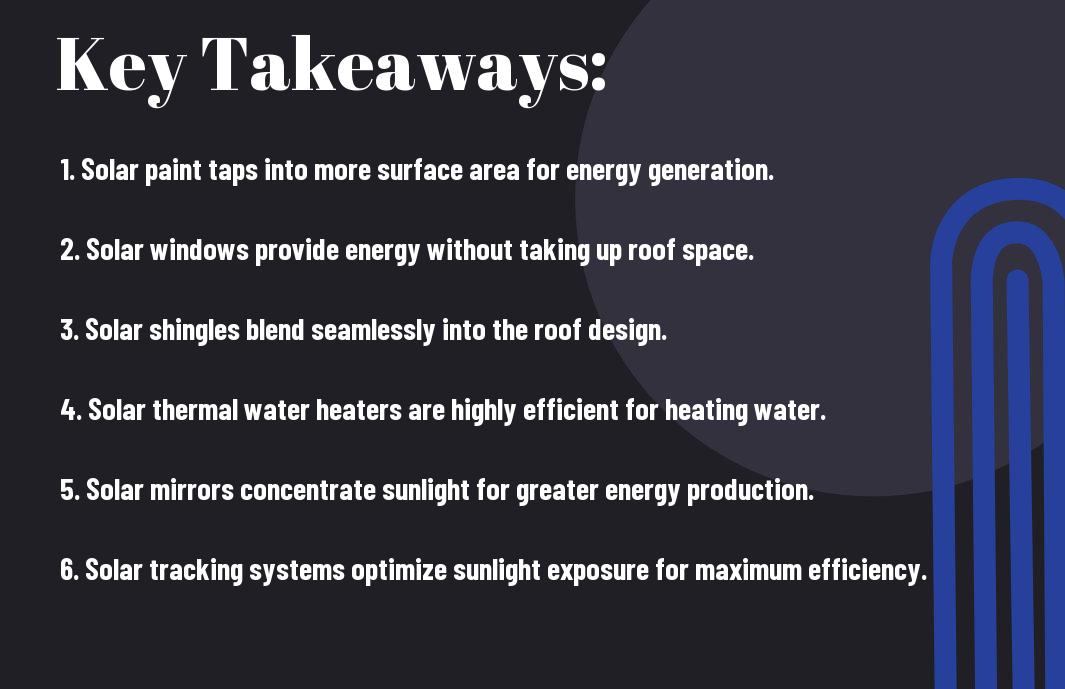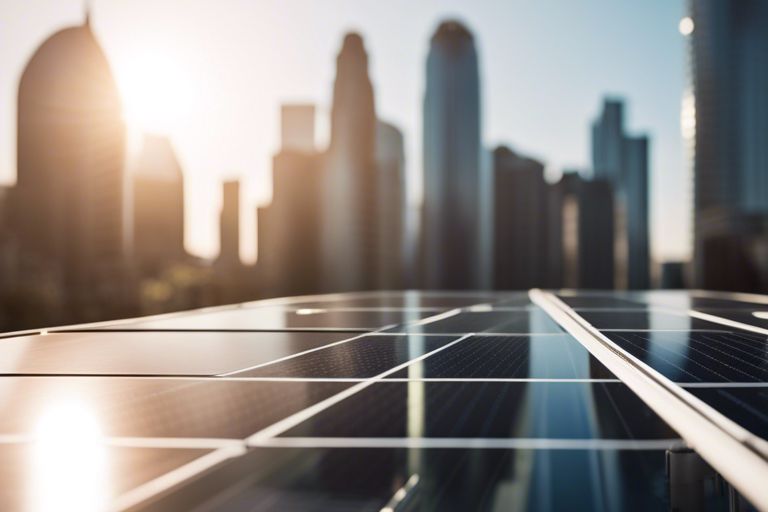Most of you may believe that solar panels are the ultimate solution for sustainable energy, but have you considered what could be even better? In this informative post, we will explore alternative energy sources that may surpass the efficiency and eco-friendliness of traditional solar panels. Get ready to reexamine your perception of renewable energy and discover what other groundbreaking options are available to power your home or business.

Key Takeaways:
- Wind energy: Wind turbines are a renewable energy source that can generate electricity even during cloudy weather or at night.
- Hydropower: Using the energy of moving water can produce a significant amount of electricity for homes and businesses.
- Geothermal energy: This renewable energy source taps into the Earth’s heat to provide heating and cooling for buildings.
- Biomass: Organic materials like wood chips, agricultural residues, and animal waste can be converted into energy through combustion or fermentation.
- Nuclear power: Despite its controversies, nuclear energy can produce large amounts of electricity with minimal greenhouse gas emissions.

The Limitations of Solar Panels
Energy Intermittency
The use of solar panels as a source of energy is not constant and reliable. The amount of energy they generate varies depending on factors such as weather conditions and the time of day. This intermittency can lead to inconsistent energy production, making it challenging to rely solely on solar power for all your energy needs. While solar panels can be a great way to reduce your carbon footprint and lower your energy bills, they may not always provide you with a consistent energy supply.
High Upfront Costs
One of the major limitations of solar panels is the high upfront costs associated with purchasing and installing them. While solar panels can help you save money on your energy bills in the long run, the initial investment required can be significant. This cost factor may deter some people from investing in solar panels, despite the potential long-term savings they offer.
Panels require a substantial initial investment, and it may take several years to recoup these costs through energy savings. Additionally, not everyone may have the financial means to install solar panels on their property, making this option less accessible to some individuals.

Alternative Renewable Energy Sources
Some alternatives to solar panels include various renewable energy sources that can help power your home or business. Here are a few options to consider:
Wind Power
The power of the wind can be harnessed to generate electricity through wind turbines. These turbines capture the kinetic energy of the wind and convert it into electricity. By placing wind turbines in locations with high wind speeds, you can generate a significant amount of clean and renewable energy for your needs.
Hydroelectric Power
On the other hand, hydroelectric power utilizes the flow of water to generate electricity. Large dams are built to store water, which is then released to drive turbines and generate power. Hydroelectric power is a reliable and consistent source of renewable energy, making it a popular choice for many regions around the world.
Energy generated from hydroelectric power is clean and sustainable, with minimal greenhouse gas emissions compared to traditional fossil fuel sources. It also provides benefits such as flood control, irrigation, and recreation opportunities in addition to producing electricity.
Geothermal Energy
Renewable geothermal energy is derived from the heat within the Earth’s core. This heat is harnessed through geothermal power plants that use steam from underground reservoirs to generate electricity. Geothermal energy is a reliable and continuous source of power that can help reduce your reliance on nonrenewable energy sources.
This type of energy is considered renewable because the heat is continuously produced within the Earth and is not depleted by human use. By tapping into geothermal energy, you can reduce your carbon footprint and contribute to a more sustainable future for the planet.
Energy Storage Solutions
Unlike solar panels that generate electricity only when the sun is shining, energy storage solutions offer a way to store excess energy for use when needed. This addresses the issue of intermittent power generation and allows you to have a consistent energy supply, even when the sun goes down or on cloudy days. Here are some innovative energy storage solutions that are better than solar panels:
Battery Technology Advancements
For battery technology advancements, researchers and companies are continuously working on improving battery performance, lifespan, and energy density. This means that newer batteries are becoming more efficient, longer-lasting, and capable of storing more energy in a smaller space. With advancements in lithium-ion, solid-state, and flow batteries, you can now store more energy for longer periods, making them a reliable choice for your energy storage needs.
Hydrogen Fuel Cells
The future of energy storage might lie in hydrogen fuel cells. These cells generate electricity through a chemical reaction of hydrogen and oxygen, producing only water and heat as byproducts. Hydrogen fuel cells are efficient, clean, and can provide a continuous source of power without harmful emissions. They are scalable and can be used for various applications, from powering small devices to providing electricity for buildings and even vehicles.
Cells
Pumped Hydro Storage
For pumped hydro storage, excess electricity is used to pump water uphill to a reservoir. When energy is needed, the water is released downhill, turning turbines to generate electricity. This method of energy storage is reliable, scalable, and has a high energy conversion efficiency. Pumped hydro storage facilities can store and produce large amounts of electricity, making them a valuable asset for balancing the grid and ensuring a stable energy supply.
Hydro
Hydro
Smart Grids and Energy Efficiency
Keep Wind vs. Solar — Which Power Source Is Better? in mind as you explore alternatives to traditional solar panels. One of the key solutions to enhancing energy efficiency and sustainable energy sources is through the implementation of smart grids.
Advanced Metering Infrastructure
On your journey to discover what is better than solar panels, consider the benefits of Advanced Metering Infrastructure (AMI). AMI allows for more precise measurement and control of energy consumption. Here are some key aspects to consider:
| Benefits | Considerations |
| Real-time data monitoring | Initial setup costs |
| Improved energy management | Data privacy concerns |
Grid-Scale Energy Storage
Infrastructure plays a crucial role in supporting grid-scale energy storage solutions. These systems are vital for capturing excess energy generated during peak times and redistributing it when needed. Energy storage technologies are advancing rapidly, offering efficient ways to store renewable energy and reduce grid strain.
Energy storage solutions such as batteries, pumped hydro, and thermal energy storage are being utilized to enhance grid stability, optimize energy use, and reduce reliance on traditional fossil fuels. These innovations are revolutionizing the way energy is stored and distributed, enhancing overall energy efficiency.
Building Automation Systems
Infrastructure that includes building automation systems can significantly improve energy efficiency in residential, commercial, and industrial settings. These systems integrate various technologies to automate lighting, heating, cooling, and other energy-consuming processes based on occupancy, temperature, and other factors. By optimizing energy use in buildings, these systems can lead to substantial energy savings and environmental benefits.
Grids are becoming smarter and more efficient, offering innovative solutions to meet the increasing energy demands sustainably. By incorporating advanced technologies and systems, you can contribute to a more sustainable energy future while maximizing energy efficiency in various sectors.
Nuclear Energy: A Viable Alternative?
Despite the controversies surrounding nuclear energy, it is considered a promising alternative to traditional energy sources like fossil fuels. With the ability to produce large amounts of power with minimal greenhouse gas emissions, nuclear energy has the potential to be a key player in the fight against climate change.
Next-Generation Reactors
Viable Next-Generation reactors are being developed to address concerns about safety and waste management. These advanced designs aim to improve efficiency and enhance safety features to prevent accidents like those seen in the past.
Waste Management and Safety Concerns
An important aspect of nuclear energy is how to handle radioactive waste and ensure the safety of both the public and the environment. Stringent regulations and protocols are in place to manage and dispose of nuclear waste properly to prevent any potential harm.
NextGeneration technologies are working towards solutions that minimize the amount of long-lived radioactive waste produced and increase the overall safety of nuclear power plants.
Cost Competitiveness
Nuclear power plants require significant upfront investment but have lower operational costs compared to traditional fossil fuel plants, making them economically competitive in the long run. Additionally, advancements in technology are driving down the overall costs of nuclear energy production.
The key to the future of nuclear energy lies in the development of innovative technologies that address safety concerns, improve waste management practices, and enhance cost efficiency. With ongoing research and development, nuclear energy has the potential to play a crucial role in our transition to a more sustainable energy future.
Emerging Technologies
Space-Based Solar Power
After considering traditional solar panels, you may be intrigued by the potential of Space-Based Solar Power (SBSP). An innovative concept where solar power is collected in space and transmitted wirelessly to Earth, SBSP has the advantage of receiving constant sunlight without atmospheric interference. While still in the research and development stage, this technology could revolutionize the way we harness solar energy.
Artificial Photosynthesis
Technologies like Artificial Photosynthesis aim to mimic the natural process of photosynthesis, where plants convert sunlight into energy. By using synthetic materials, scientists are working towards creating efficient systems that can produce clean fuels directly from sunlight and carbon dioxide. This cutting-edge technology has the potential to provide a sustainable and renewable energy source for the future.
Artificial Photosynthesis is a promising area of research that could lead to significant advancements in green energy production. By harnessing the power of sunlight and converting it into fuel, we could reduce our dependence on fossil fuels and mitigate the impact of climate change.
Bio-Energy with Carbon Capture and Storage (BECCS)
BECCS is an exciting technology that combines bio-energy production with carbon capture and storage. By using organic materials like plants to generate energy, BECCS captures the carbon dioxide released during the process and stores it underground. This innovative approach not only produces renewable energy but also helps to reduce greenhouse gas emissions, making it a promising solution for combating climate change.
BECCS represents a creative way to address both energy production and environmental concerns. By integrating bio-energy with carbon capture and storage, we have the opportunity to create a more sustainable and eco-friendly energy system for the future.
Summing up
As a reminder, while solar panels are a great sustainable energy option, there are other technologies and solutions that can be considered even better in certain circumstances. By exploring alternatives such as wind turbines, hydroelectric power, and geothermal systems, you can find the best fit for your specific energy needs and environmental goals. Each option has its advantages and drawbacks, so it’s imperative to conduct thorough research and consider all aspects before making a decision.
Q: What is better than solar panels?
A: Wind turbines are considered a better alternative to solar panels in certain locations where there is consistent wind flow.
Q: Are there any other renewable energy sources that are more efficient than solar panels?
A: Geothermal energy is another renewable energy source that is considered to be more efficient than solar panels in terms of consistent power generation and lower maintenance costs.
Q: Is there any technology that can outperform solar panels in terms of energy production?
A: Some research suggests that advanced hydroelectric power plants can outperform solar panels in terms of energy production, especially in regions with abundant water resources.
